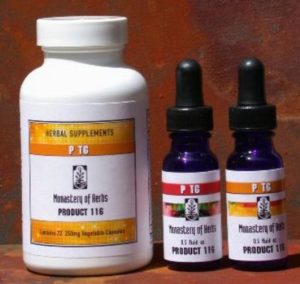A letter from Dr. L.J. Marx about a Monastery of Herbs case study on pelvic inflammatory disease:
This is in response to a plea for help regarding PID. Yes, there are some problems associated with identifying and treating many infections. We need to realize the limitations of medical diagnosis and the use of antibiotics if we are to become free from dependency upon outworn medical technology.
Antibiotics usually work through the circulatory system. The tissues that are richly supplied with blood are likely to receive more antibiotic. The tissues that have less blood supply are less likely to respond to the drugs. This has been demonstrated in syphilis where antibiotics will clear the bloodstream of the infection and the VDRL will become negative. However, the spirochetes continue to thrive in the tissue.
Another problem with antibiotics is the limited range of infections that are affected. Each type of antibiotic will affect some types of bacteria while other bacteria will not be affected.
Also, bacteria can develop resistance to antibiotics. That leaves many types of bacteria untreated. Many bacterial infections are secondary infections. That is, they live on tissue damaged due to underlying viral, parasitic and fungal infections.
Antibiotics are relatively ineffective against most primary infections. If viral infections are not cleared then bacterial infections will return even if they were successfully treated prior to treating the viral infection. In my experience viruses most frequently set the stage for secondary infections. Therefore, any program that does not effectively treat the viruses will not succeed.
With PID, the Herpes Simplex #2 (Genital Herpes) and the Human Papilloma Virus are frequently involved. Although all the chronic fatigue viruses tend to locate wherever there is tissue damage and further aggravate the disease.
The two bacterial infections most associated with PID are Gonorrhea and Syphilis. Other bacterial infections to look for are Chlamydia, Lumphogranuloma Venereum and Tuberculosis. When I started to practice herbal medicine, the biggest problem was getting an accurate diagnosis. I quickly learned that the standard laboratory tests were not accurate enough to rely upon.
This let me to adopt a form of muscle testing called Neuro-Kinesiology developed by Dr. Clifton Alldredge. He also developed specific herbal programs for the treatment of the many dozens of infections. Actually, to be accurate, we really treat the reflex points rather than the infection. We simply do not have the millions of dollars needed to verify whether the reflex point for a specific infection is identical to the medically recognized organism. Nevertheless, the results have been consistently effective and the system works better than anything else I have encountered.
Herbals work on a different principle than antibiotics (at least the herbals I use). Herbals appear to work on a vibratory basis. The effect of this is that the remedies are not dependent on the circulatory system to be effective. Therefore, the herbals work any place in the body regardless whether there is a blood supply or not. Actually I have observed excellent results from simply having a person soak in an herbal bath.
L.J. Marx, M.D.
About Monastery of Herbs
Monastery of Herbs provides “prescription” level wholesale and resale herbs, custom made fresh every day, in a monastery setting. (Note: These herbs promote physical healing.) Monastery of Herbs offers one-on-one telephone seminars for professionals with a wholesale license.
Please email to monasteryofherbs@yahoo.com, to make arrangements for a seminar. Please also communicate with and share about Monastery of Herbs, via social media on Twitter, Facebook, and other websites.
Monastery of Herbs Case Study: Pelvic Disease

